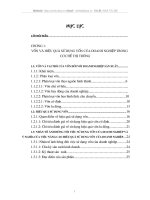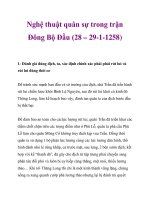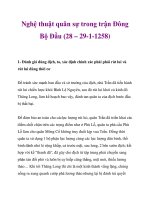modernspeechrecognitionapproachesito12 1258
Bạn đang xem bản rút gọn của tài liệu. Xem và tải ngay bản đầy đủ của tài liệu tại đây (2.15 MB, 7 trang )
MODERN
SPEECH
RECOGNITION
APPROACHES
WITH
CASE STUDIES
Edited by S. Ramakrishnan
MODERN SPEECH
RECOGNITION
APPROACHES WITH
CASE STUDIES
Edited by S. Ramakrishnan
Modern Speech Recognition Approaches with Case Studies
/>Edited by S. Ramakrishnan
Contributors
Chung-Hsien Wu, Chao-Hong Liu, R. Thangarajan, Aleem Mushtaq, Ronan Flynn, Edward
Jones, Santiago Omar Caballero Morales, Jozef Juhár, Peter Viszlay, Longbiao Wang, Kyohei
Odani, Atsuhiko Kai, Norihide Kitaoka, Seiichi Nakagawa, Masashi Nakayama, Shunsuke
Ishimitsu, Seiji Nakagawa, Alfredo Victor Mantilla Caeiros, Hector Manuel Pérez Meana, Komal
Arora, Ján Staš, Daniel Hládek, Jozef Juhár, Dia AbuZeina, Husni Al-Muhtaseb, Moustafa
Elshafei, Nelson Neto, Pedro Batista, Aldebaro Klautau
Published by InTech
Janeza Trdine 9, 51000 Rijeka, Croatia
Copyright © 2012 InTech
All chapters are Open Access distributed under the Creative Commons Attribution 3.0 license,
which allows users to download, copy and build upon published articles even for commercial
purposes, as long as the author and publisher are properly credited, which ensures maximum
dissemination and a wider impact of our publications. After this work has been published by
InTech, authors have the right to republish it, in whole or part, in any publication of which they
are the author, and to make other personal use of the work. Any republication, referencing or
personal use of the work must explicitly identify the original source.
Notice
Statements and opinions expressed in the chapters are these of the individual contributors and
not necessarily those of the editors or publisher. No responsibility is accepted for the accuracy
of information contained in the published chapters. The publisher assumes no responsibility for
any damage or injury to persons or property arising out of the use of any materials,
instructions, methods or ideas contained in the book.
Publishing Process Manager Dimitri Jelovcan
Typesetting InTech Prepress, Novi Sad
Cover InTech Design Team
First published November, 2012
Printed in Croatia
A free online edition of this book is available at www.intechopen.com
Additional hard copies can be obtained from
Modern Speech Recognition Approaches with Case Studies, Edited by S. Ramakrishnan
p. cm.
ISBN 978-953-51-0831-3
Contents
Preface IX
Section 1
Speech Recognition
1
Chapter 1
Robust Speech Recognition for Adverse Environments
Chung-Hsien Wu and Chao-Hong Liu
Chapter 2
Speech Recognition for Agglutinative Languages 37
R. Thangarajan
Chapter 3
A Particle Filter Compensation Approach
to Robust Speech Recognition 57
Aleem Mushtaq
Chapter 4
Robust Distributed Speech Recognition
Using Auditory Modelling 79
Ronan Flynn and Edward Jones
Chapter 5
Improvement Techniques
for Automatic Speech Recognition 105
Santiago Omar Caballero Morales
Chapter 6
Linear Feature Transformations in Slovak Phoneme-Based
Continuous Speech Recognition 131
Jozef Juhár and Peter Viszlay
Chapter 7
Dereverberation Based on Spectral Subtraction
by Multi-Channel LMS Algorithm for Hands-Free
Speech Recognition 155
Longbiao Wang, Kyohei Odani, Atsuhiko Kai,
Norihide Kitaoka and Seiichi Nakagawa
Section 2
Speech Enhancement 175
Chapter 8
Improvement on Sound Quality of the Body Conducted
Speech from Optical Fiber Bragg Grating Microphone 177
Masashi Nakayama, Shunsuke Ishimitsu and Seiji Nakagawa
3
VOICECONET: A Collaborative Framework for
325
for Brazilian Portuguese
23
Speech-Based
with aPortuguese
Case Study
VOICECONET: A Collaborative Framework for Speech-Based
ComputerComputer
Accessibility withAccessibility
a Case Study for Brazilian
[29] Nua [2012]. Nuance Communications, Inc. Visited in March.
URL: www.nuance.com
[30] O’Harea, E. & McTearb, M. [1999]. Speech recognition in the secondary school classroom:
an exploratory study, Computers & Education, 33 (1): 27–45.
[31] Sabau, G., Bologa, R., Bologa, R. & Muntean, M. [2009]. Collaborative network for
the development of an informational system in the SOA context for the university
management, International Conference on Computer Technology and Development, 1
pp. 307–311.
[32] SAM [2012]. SAMPA Phonetic Alphabet. Visited in March.
URL: www.phon.ucl.ac.uk/home/sampa/
[33] SAP [2012]. Microsoft Speech API. Visited in March.
URL: www.microsoft.com/speech/
[34] Saz, O., Yin, S.-C., Lleida, E., Rose, R., Vaquero, C. & Rodríguez, W. [2009]. Tools and
technologies for computer-aided speech and language therapy, Speech Communication, 51
(10): 948–967.
[35] Schramm, M., Freitas, L., Zanuz, A. & Barone, D. [2000]. A Brazilian Portuguese
language corpus development, International Conference on Spoken Language Processing, 2
pp. 579–582.
[36] Schröder, M. & Trouvain, J. [2001]. The German text-to-speech synthesis system MARY:
A tool for research, development and teaching, International Journal of Speech Technology,
6 (4): 365–377.
[37] Sealea, J. & Cooperb, M. [2010]. E-learning and accessibility: An exploration of the
potential role of generic pedagogical tools, Computers & Education, 54 (4): 1107–1116.
[38] Silva, D., Braga, D. & Resende, F. [2008]. Separaỗóo das sớlabas e determinaỗóo da
tonicidade no Portuguờs Brasileiro, XXVI Simpúsio Brasileiro de Telecomunicaỗừes
pp. 15.
[39] Silva, D., de Lima, A., Maia, R., Braga, D., de Moraes, J., de Moraes, J. & Resende, F.
[2006]. A rule-based grapheme-phone converter and stress determination for Brazilian
Portuguese natural language processing, VI International Telecommunications Symposium
pp. 992–996.
[40] Silva, P., Batista, P., Neto, N. & Klautau, A. [2010]. An open-source speech recognizer for
Brazilian Portuguese with a windows programming interface, Computational Processing
of the Portuguese Language, Springer, 6001 pp. 128–131.
[41] Silva, P., Neto, N. & Klautau, A. [2009]. Novos recursos e utilizaỗóo de adaptaỗóo de
locutor no desenvolvimento de um sistema de reconhecimento de voz para o Portuguờs
Brasileiro, XXVII Simpúsio Brasileiro de Telecomunicaỗừes pp. 1–6.
[42] Siravenha, A., Neto, N., Macedo, V. & Klautau, A. [2008]. Uso de regras fonolúgicas com
determinaỗóo de vogal tụnica para conversão grafema-fone em Português Brasileiro, 7th
International Information and Telecommunication Technologies Symposium pp. 1–6.
[43] Siravenha, A., Neto, N., Macedo, V. & Klautau, A. [2009]. A computer-assisted learning
software using speech synthesis and recognition in Brazilian Portuguese, Interactive
Computer Aided Blended Learning pp. 1–5.
[44] Stolcke, A. [2002]. SRILM - an extensible language modeling toolkit, International
Conference on Spoken Language Processing pp. 901–904.
[45] Taylor, P. [2009]. Text-To-Speech Synthesis, Cambridge University Press.
326 24
Modern Speech Recognition Approaches with Case Studies
Speech Recognition
[46] Teixeira, A., Oliveira, C. & Moutinho, L. [2006].
On the use of machine
learning and syllable information in European Portuguese grapheme-phone conversion,
Computational Processing of the Portuguese Language, Springer, 3960 pp. 212–215.
[47] UFR [2012]. Accessibility Projects of NCE/UFRJ. Visited in March.
URL: />[48] Vandewalle, P., Kovacevic, J. & Vetterli, M. [2009]. Reproducible research in signal
processing - what, why, and how, IEEE Signal Processing Magazine, 26 pp. 37–47.
[49] Voi [2012]. VOICECONET. Visited in March.
URL: www.laps.ufpa.br/falabrasil/voiceconet/
[50] Vox [2012]. VoxForge.org. Visited in March.
URL: www.voxforge.org
[51] Walker, W., Lamere, P., Kwok, P., Raj, B., Singh, R., Gouvea, E., Wolf, P. & Woelfel,
J. [2004]. Sphinx-4: A Flexible Open Source Framework for Speech Recognition, Sun
Microsystems, TR-2004-139.
[52] Wang, T.-H. [2010]. Web-based dynamic assessment: Taking assessment as teaching
and learning strategy for improving students’ e-learning effectiveness, Computers &
Education, 54 (4): 1157–1166.
[53] Ynoguti, C. A. & Violaro, F. [2008]. A Brazilian Portuguese speech database, XXVI
Simpósio Brasileiro de Telecomunicaỗừes pp. 16.
[54] Yoshimura, T., Tokuda, K., Masuko, T., Kobayashi, T. & Kitamura, T. [1999].
Simultaneous modeling of spectrum, pitch and duration in HMM-based speech
synthesis, Proc. of EUROSPEECH, 5 pp. 2347–2350.
[55] Young, S., Ollason, D., Valtchev, V. & Woodland, P. [2006]. The HTK Book, Cambridge
University Engineering Department, Version 3.4.









